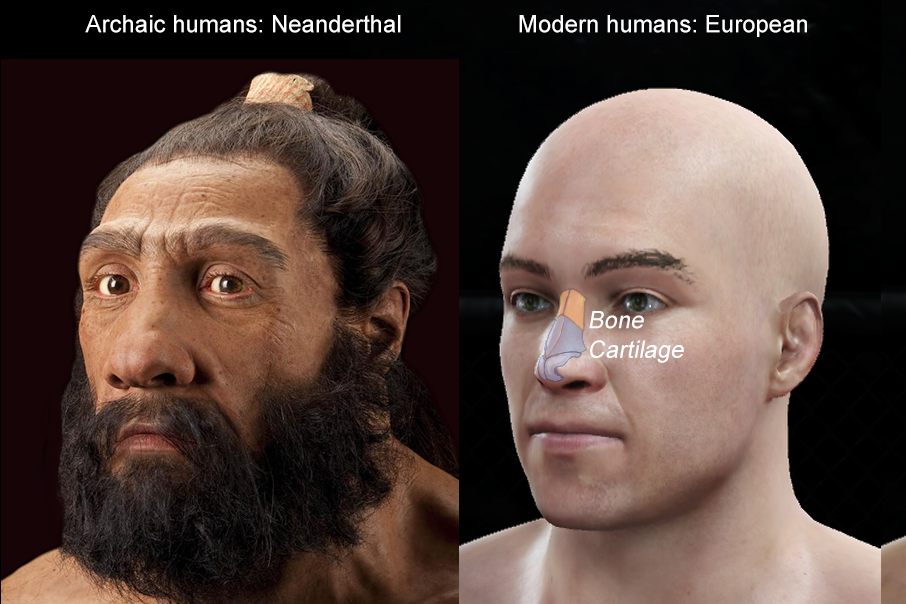Humans may have inherited nose shape gene from Neanderthals, study suggests
A particular gene, which leads to a taller nose, could have been the product of natural selection as ancient humans adapted to cold.

Your support helps us to tell the story
From reproductive rights to climate change to Big Tech, The Independent is on the ground when the story is developing. Whether it's investigating the financials of Elon Musk's pro-Trump PAC or producing our latest documentary, 'The A Word', which shines a light on the American women fighting for reproductive rights, we know how important it is to parse out the facts from the messaging.
At such a critical moment in US history, we need reporters on the ground. Your donation allows us to keep sending journalists to speak to both sides of the story.
The Independent is trusted by Americans across the entire political spectrum. And unlike many other quality news outlets, we choose not to lock Americans out of our reporting and analysis with paywalls. We believe quality journalism should be available to everyone, paid for by those who can afford it.
Your support makes all the difference.The shape of our noses may be determined by a genetic material inherited from Neanderthals, new research suggests.
A new study led by UCL researchers found that a particular gene, which leads to a taller nose (from top to bottom), may have been the product of natural selection as ancient humans adapted to colder climates after leaving Africa.
Co-corresponding author Dr Kaustubh Adhikari, UCL Genetics, Evolution & Environment and The Open University, said: “In the last 15 years, since the Neanderthal genome has been sequenced, we have been able to learn that our own ancestors apparently interbred with Neanderthals, leaving us with little bits of their DNA.
“Here, we find that some DNA inherited from Neanderthals influences the shape of our faces.
“This could have been helpful to our ancestors, as it has been passed down for thousands of generations.”
The gene we have identified here may have been inherited from Neanderthals to help humans adapt to colder climates as our ancestors moved out of Africa
The researchers used data from more than 6,000 people across Latin America, of mixed European, Native American and African ancestry, who are part of the UCL-led Candela study, which recruited from Brazil, Colombia, Chile, Mexico and Peru.
Genetic information from the people was compared to photographs of their faces.
To see how different facial traits were linked to the presence of different genetic markers, the researchers looked specifically at distances between points on their faces, such as the tip of the nose or the edge of the lips.
According to the study, researchers newly identified 33 genome regions associated with face shape.
They were able to replicate 26 in comparisons with data from other ethnicities using people in east Asia, Europe, or Africa.
In one genome region in particular, called ATF3, the researchers found that many people in their study with Native American ancestry (as well as others with east Asian ancestry from another group) had genetic material in this gene that was inherited from the Neanderthals.
They found that this contributed to increased nasal height.
This gene region has signs of natural selection, suggesting that it conferred an advantage for those carrying the genetic material, the researchers say.
First author Dr Qing Li, Fudan University, said: “It has long been speculated that the shape of our noses is determined by natural selection; as our noses can help us to regulate the temperature and humidity of the air we breathe in, different shaped noses may be better suited to different climates that our ancestors lived in.
“The gene we have identified here may have been inherited from Neanderthals to help humans adapt to colder climates as our ancestors moved out of Africa.”
Co-corresponding author Professor Andres Ruiz-Linares, Fudan University, UCL Genetics, Evolution & Environment, and Aix-Marseille University, added: “Most genetic studies of human diversity have investigated the genes of Europeans; our study’s diverse sample of Latin American participants broadens the reach of genetic study findings, helping us to better understand the genetics of all humans.”
Researchers say the finding, published in Communications Biology, is the second discovery of DNA from archaic humans, distinct from Homo sapiens, affecting our face shape.
The same team discovered in a 2021 paper that a gene influencing lip shape was inherited from the ancient Denisovans.